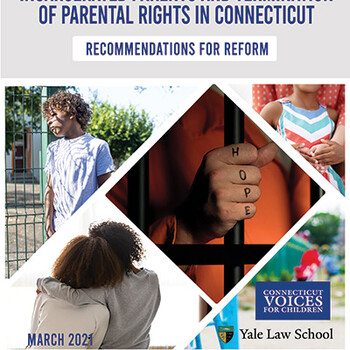Clinic Releases Report on Preserving Parental Rights for Incarcerated Parents

Connecticut Voices for Children4 (CT Voices) and the Criminal Justice Advocacy Clinic5 of the Jerome N. Frank Legal Services Organization at Yale Law School (CJAC) released a report on March 12, 2021 that examines the collateral consequences of the Adoption and Safe Families Act on children with incarcerated parents.
The report, “Incarcerated Parents and Termination of Parental Rights in Connecticut: Recommendations for Reform6,” examines the unintended impacts of the Adoption and Safe Families Act (ASFA), a federal law passed in 1997 that shifted the goal of child-protection policy from family preservation to adoption, and outlines recommendations to protect parental rights and promote the welfare of children with incarcerated parents.

“As it stands, the Adoption and Safe Families Act can unintentionally cause harm to children and families with incarcerated parents,” said Emily Byrne, Executive Director of Connecticut Voices for Children. “It is well within the power of the state to implement exceptions to the ASFA guidelines that would benefit the well-being of children and protect the rights of incarcerated parents; attention to this matter is even especially important during the pandemic.
According to the report, ASFA almost always requires states to move for termination of parental rights (TPR) when a child has been in foster care for 15 of the last 22 months. By statute, judges must consider the parent’s “degree of personal rehabilitation” and “[t]he extent to which the parent has maintained contact with the child, including visitations, communications, or contributions.”
This presents unique challenges for incarcerated parents who often face barriers to maintaining contact including, but not limited to: the distance that many parents are incarcerated from their homes; the cost of visiting; the cost of phone calls; and the frequent relocation of children in foster care. According to the Marshall Project,7 from 2006–2019, at least 32,000 incarcerated parents’ parental rights have been terminated nationally, with approximately 5,000 seemingly on the basis of their incarceration alone.
“Preserving families is important for reducing trauma to parents and kids, and for promoting public safety,” said Allison Durkin ’21 with the Criminal Justice Advocacy Clinic. “Many parents are losing their parental rights not because they harmed their children but because of the length of their incarceration.”
Research has demonstrated that maintaining family bonds can promote children’s healthy development: Family separation can produce toxic stress, which can have life-long adverse impacts on the physical and mental health of both parents and children. The maintenance of the parent-child relationship also reduces the likelihood that an incarcerated parent will return to prison once released.
As outlined in the report, in the two decades since ASFA’s passage, the number of children with an incarcerated parent has increased by approximately 80 percent, and rates of TPR have substantially increased. In 2019 alone, 673,000 children across the United States were in the foster care system, and states terminated the parental rights of 71,300 parents. The same year, Connecticut had 5,980 children in the foster care system, and terminated the parental rights of 353 people.
“The connection between a parent and child is sacred,” said Eleanor Roberts with the Criminal Justice Advocacy Clinic. “In cases where DCF follows the ASFA timeline for incarcerated parents, parents become permanently disconnected from their children and too often these children are left in foster care with no legal kin for the rest of their youth.”
ASFA disproportionately harms Black and Latinx children, children living in poverty, and their parents — and disparities have only been exacerbated due to the COVID-19 pandemic. As prisons across the country have decreased visitation, it’s even harder for families to keep in touch.
“We are calling on Connecticut to take critical steps toward keeping families together. Termination of parental rights punishes children and strips them of stability and resources,” said Destiny Lopez ’21 with the Criminal Justice Advocacy Clinic. “Studies show that children are safest at home, with people who love them, and with the opportunity to safely reunify with their parents when it is possible to do so.”
To protect parental rights and promote the welfare of children with incarcerated parents the report outlines 18 recommendations to:
- Prevent TPR due to parents’ incarceration status
- Support communication between children and incarcerated parents
- Mitigate harm and promote rights
- Promote awareness
State policy recommendations include but are not limited to:
- Pausing the TPR timeline and prohibiting filing when length of incarceration is a cause
- Establishing a commission to study and promote racial equity in the child welfare system in Connecticut, particularly with respect to TPR
- Expanding alternatives to incarceration where appropriate
- Increasing family connection by providing free calls, contact information, and visits
- Passing legislation creating a presumption that caseworkers should file for an exception to TPR when incarceration status contributed to the 15/22 timeline
- Publishing data on TPR and incarceration
The report notes that no recommendations presented would risk reduction in Connecticut’s federal funding, because all reforms fall within Connecticut’s existing discretion pursuant to ASFA.
Read the frequently asked questions9
Connecticut Voices for Children is a “think and do” tank working to ensure that Connecticut is a thriving and equitable state, and where all children achieve their full potential. In furtherance of its vision, Connecticut Voices for Children produces high-quality research and analysis, promotes citizen education, advocates for policy change at the state and local level, and works to develop the next generation of leaders.
The Yale Law School Criminal Justice Advocacy Clinic (CJAC) represents individuals and organizations affected by the criminal legal system. The work of the CJAC is supported by the Millstone Fund for Criminal Justice Reform.


